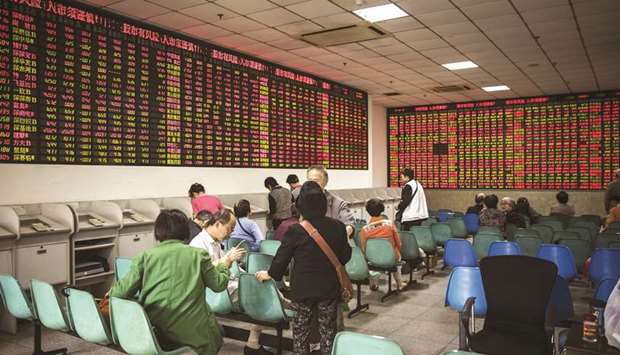The $941bn China Investment Corp (CIC) wants permission to invest in local shares and bonds, and has laid the groundwork for an application to the central government, people with knowledge of the matter said. While it remains unclear if top leaders will grant approval, the potential move by the Beijing-based investor would add an engine of growth to complement an overseas portfolio that posted record returns last year.
China’s equity and bond markets are under pressure from a trade war and rising defaults, with the benchmark stock gauge sliding into a bear market last month and slipping again yesterday after data showed an economic slowdown. Mainland stocks are the cheapest relative to a gauge of Chinese stocks traded offshore in almost four years. At a public forum last month, CIC’s head of asset allocation Fan Hua said she saw “very good opportunities” in Chinese shares and yuan-denominated bonds should the fund be allowed to invest.
Adding to the appeal of stocks listed in China is their inclusion by MSCI Inc in global indexes in June. For CIC, whose mandate since its 2007 inception has been to invest the nation’s foreign-exchange reserves offshore, that restriction puts it at a disadvantage to global peers. It also creates potential complications because about two-thirds of its overseas portfolio is farmed out to external managers, some of which may be already investing in China shares after the MSCI move.
From an asset allocation perspective, Chinese shares can bring good expected returns amid solid corporate profits and low valuations, better chances for alpha thanks to the dominance of retail investors, and a market featuring “very low correlation’’ with others, Fan said at the June 29 forum. The valuations of domestic shares are “very attractive” after recent declines, Fan said, adding that many Chinese companies still enjoy robust profitability even as the economy slows.
The growing ranks of local hedge funds, many of which are delivering good returns, would also provide a “sizeable’’ pool of external managers to choose from, she said at the time.
An e-mail to Beijing-based CIC went unanswered, as did a fax sent to the State Council. Domestics stocks might be appealing to an investor willing to stomach near-term risks. The Shanghai Composite is down more than 20% from a January high. The gauge trades at 14 times earnings, compared with a ratio of 21 for the S&P 500 Index.
A falling yuan could further add momentum to the proposal, as any subsequent conversion of foreign reserve dollars into local currency would support the yuan. Allowing CIC to invest in domestic stocks was a lot less palatable when it was set up, a time when a soaring trade surplus drove up foreign reserves quickly and a strong yuan undermined exporters.
CIC reported its best annual performance ever in 2017, as its stock holdings, which account for the largest portion of its overseas portfolio, benefited from soaring markets worldwide. The wealth fund is boosting allocations to direct and alternative investments for more stable returns and to cut exposure to volatile public markets, company executives have said.
That shows the counter-cyclical nature of foreign exchange reserve investments, which can help China ride out downturns in its own economic cycles, said Li Jie, head of the foreign reserves research centre at Beijing-based Central University of Finance and Economics.
“My advice would be stick to being counter-cyclical,’’ said Li, adding that bringing up to 10% of assets back home would be an acceptable level. “But if it’s massive, I feel it’s bit inappropriate.”

